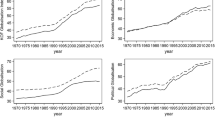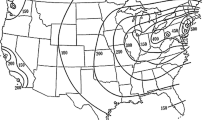Abstract
This paper aims to analyze the impact of geopolitical risks measured by a new index of geopolitical risk (GPR) on inbound tourism. For this purpose, we use the fixed-effects and the least squares dummy variable corrected estimations for panel data of 18 countries for the period from 1995 to 2016. We find that geopolitical risks negatively affect inbound tourism. We also implement various robustness checks, such as introducing control variables, considering the lagged effect of the GPR, and utilizing different econometric techniques.
Similar content being viewed by others
Notes
Please see Appendix 1 for the list of countries.
Therefore, the GPR index considers both conflicts and political instability as well as the measures of terrorism.
Visit https://www2.bc.edu/matteo-iacoviello/gpr.htm for the details of the GPR indexes.
The bias correction is initialized by the Blundell–Bond estimator.
Specifically, our data have 18 countries and 22 years, that is T > N. For details, see Bruno (2005).
References
Antonakakis, N., Gupta, R., Kollias, C., & Papadamou, S. (2017). Geopolitical risks and the oil-stock Nexus over 1899–2016. Finance Research Letters, 23, 165–173.
Apergis, N., Bonato, M., Gupta, R., & Kyei, C. (2018). Does geopolitical risks predict stock returns and volatility of leading defense companies? Evidence from a nonparametric approach. Defence and Peace Economics, 29(6), 684–696.
Araña, J. E., & León, C. J. (2008). The impact of terrorism on tourism demand. Annals of Tourism Research, 35(2), 299–315.
Aysan, A. F., Demir, E., Gozgor, G., & Lau, C. K. M. (2019). Effects of the geopolitical risks on Bitcoin returns and volatility. Research in International Business and Finance, 47, 511–518.
Bilgin, M. H., Gozgor, G., & Karabulut, G. (2018). How do geopolitical risks affect the government investment? An empirical investigation. Defence and Peace Economics. https://doi.org/10.1080/10242694.2018.1513620.
Bilgin, M. H., Gozgor, G., & Lau, C. K. M. (2017). Institutions and gravity model: The role of political economy and corporate governance. Eurasian Business Review, 7(3), 421–436.
Bruno, G. S. F. (2005). Estimation and inference in dynamic unbalanced panel data models with a small number of individuals. Stata Journal, 5(4), 473–500.
Caldara D, Iacoviello M. (2018). Measuring geopolitical risk. Board of Governors of the Federal Reserve Board Working Paper.
Demir, E., & Gozgor, G. (2018). Does economic policy uncertainty affect tourism? Annals of Tourism Research, 69, 15–17.
Enders, W., Sandler, T., & Parise, G. F. (1992). An econometric analysis of the impact of terrorism on tourism. Kyklos, 45(4), 531–554.
Ghaderi, Z., Saboori, B., & Khoshkam, M. (2017). Does security matter in tourism demand? Current Issues in Tourism, 20(6), 552–565.
Gholipour, H. F., Tajaddini, R., & Al-mulali, U. (2014). Does personal freedom influence outbound tourism? Tourism Management, 41, 19–25.
Gholipour, H. F., Tajaddini, R., & Nguyen, J. (2016). Happiness and inbound tourism. Annals of Tourism Research, 57, 251–253.
Goh, C. (2012). Exploring impact of climate on tourism demand. Annals of Tourism Research, 39(4), 1859–1883.
Gozgor, G., & Can, M. (2016). Effects of the product diversification of exports on income at different stages of economic development. Eurasian Business Review, 6(2), 215–235.
Gozgor, G., & Demir, E. (2018). The effects of economic policy uncertainty on outbound travel expenditures. Journal of Competitiveness, 10(3), 5–15.
Gozgor, G., Demir, E., & Bilgin, M. H. (2017). The effects of the military in politics on the inbound tourism: Evidence from Turkey. Asia Pacific Journal of Tourism Research, 22(8), 885–893.
Gupta, R., Gozgor, G., Kaya, H., & Demir, E. (2018). Effects of geopolitical risks on trade flows: Evidence from the gravity model. Eurasian Economic Review. https://doi.org/10.1007/s40822-018-0118-0.
McCabe, S., & Johnson, S. (2013). The happiness factor in tourism: Subjective well-being and social tourism. Annals of Tourism Research, 41, 42–65.
Ram, Y., Nawijn, J., & Peeters, P. M. (2013). Happiness and limits to sustainable tourism mobility: A new conceptual model. Journal of Sustainable Tourism, 21(7), 1017–1035.
Saha, S., Su, J. J., & Campbell, N. (2017). Does political and economic freedom matter for inbound tourism? A cross-national panel data estimation. Journal of Travel Research, 56(2), 221–234.
Saha, S., & Yap, G. (2014). The moderation effects of political instability and terrorism on tourism development: A cross-country panel analysis. Journal of Travel Research, 53(4), 509–521.
Song, H., Dwyer, L., Li, G., & Cao, Z. (2012). Tourism economics research: A review and assessment. Annals of Tourism Research, 39(3), 1653–1682.
Song, H., & Li, G. (2008). Tourism demand modelling and forecasting: A review of recent research. Tourism Management, 29(2), 203–220.
Tang, C. F. (2018). The impacts of governance and institutions on inbound tourism demand: Evidence from a dynamic panel data study. Asia Pacific Journal of Tourism Research, 23(10), 1000–1007.
Thompson, A. (2011). Terrorism and tourism in developed versus developing countries. Tourism Economics, 17(3), 693–700.
Author information
Authors and Affiliations
Corresponding author
Additional information
Publisher's Note
Springer Nature remains neutral with regard to jurisdictional claims in published maps and institutional affiliations.
Appendices
Appendix 1
1.1 List of countries and details of six groups in Geopolitical Risk (GPR) Index
GPR Index is available for Argentina, Brazil, China, Colombia, India, Indonesia, Israel, the Korea Republic, Malaysia, Mexico, the Philippines, Russia, Saudi Arabia, South Africa, Thailand, Turkey, Ukraine, and Venezuela.
There are six sub-groups in the GPR index. Group 1 includes words associated with explicit mentions of geopolitical risk, as well as mentions of military-related tensions involving large regions of the world and the US involvement. Group 2 includes words directly related to nuclear tensions. Groups 3 and 4 include mentions related to war threats and terrorist threats, respectively. Finally, Groups 5 and 6 aim at capturing press coverage of actual adverse geopolitical events (as opposed to just risks) which can be reasonably expected to lead to increases in geopolitical uncertainty, such as terrorist acts or the beginning of a war.
Appendix 2
See Fig. 1.
Appendix 3
See Table 3.
Rights and permissions
About this article
Cite this article
Demir, E., Gozgor, G. & Paramati, S.R. Do geopolitical risks matter for inbound tourism?. Eurasian Bus Rev 9, 183–191 (2019). https://doi.org/10.1007/s40821-019-00118-9
Received:
Revised:
Accepted:
Published:
Issue Date:
DOI: https://doi.org/10.1007/s40821-019-00118-9





